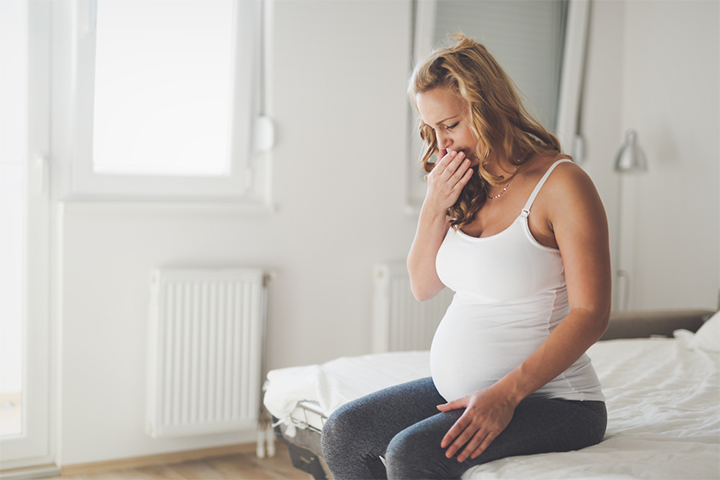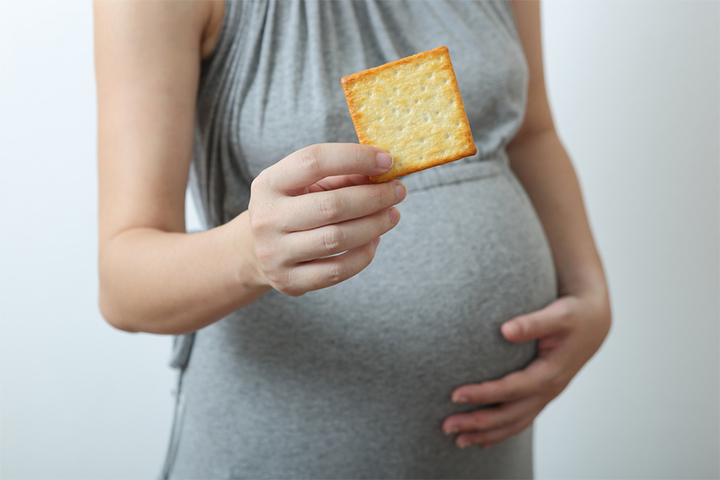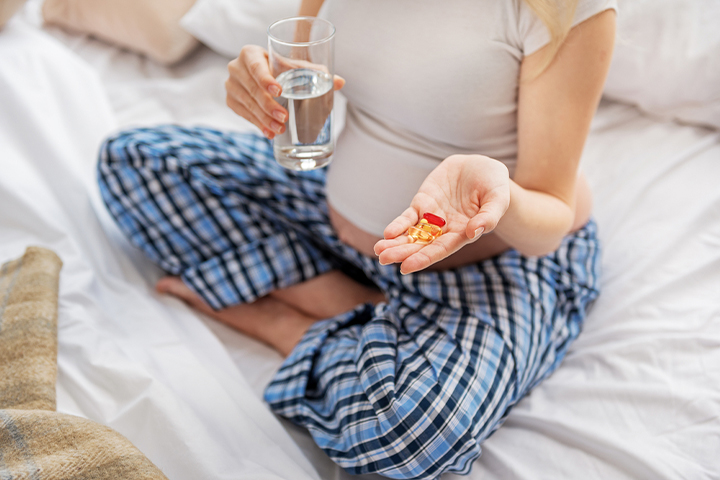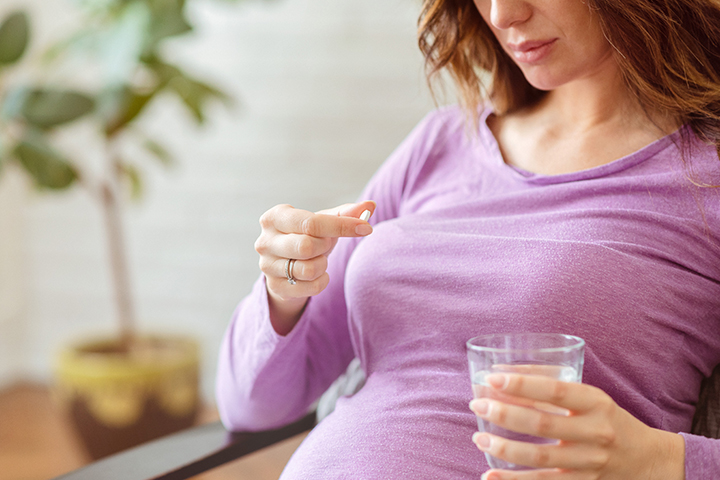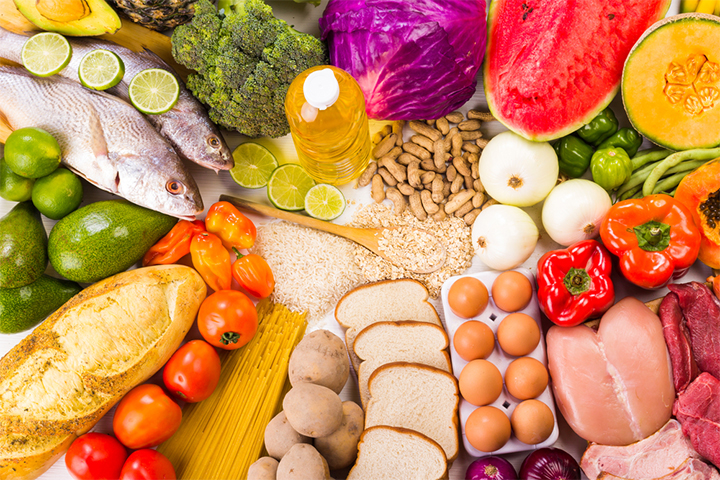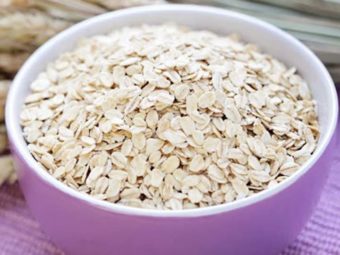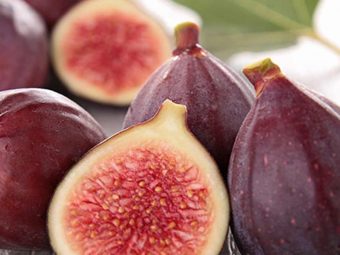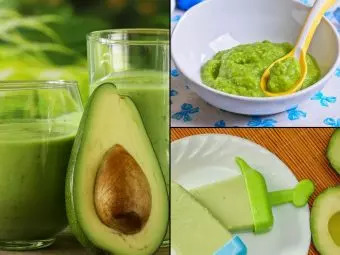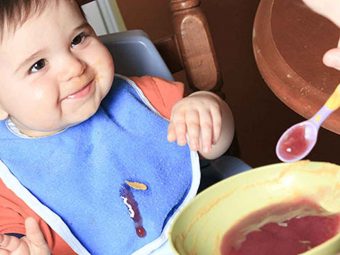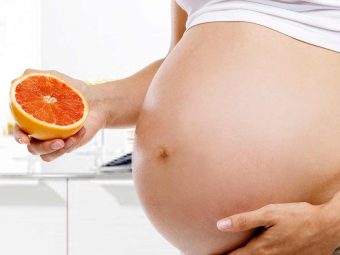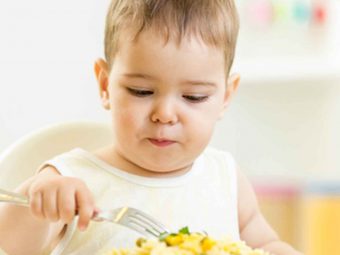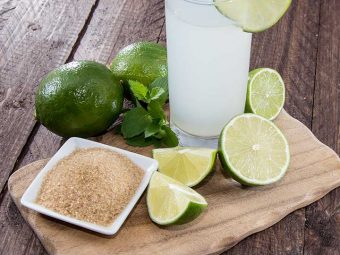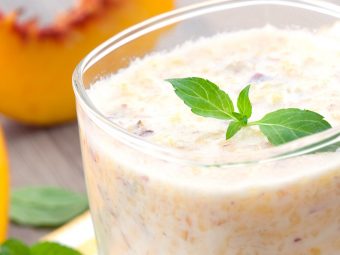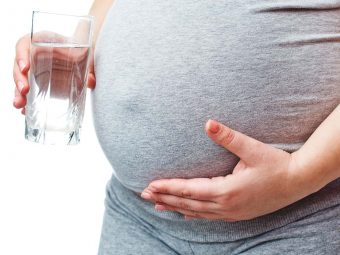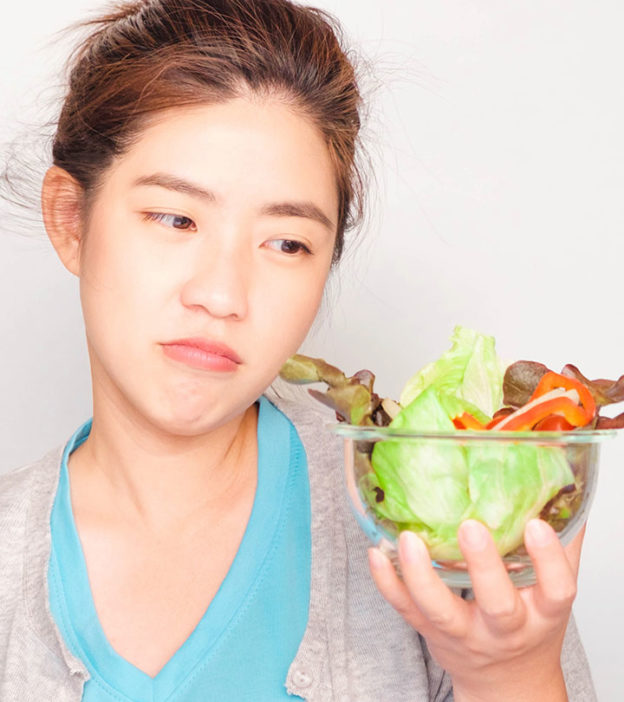
Image: Shutterstock
Appetite loss during pregnancy is common. Nausea, food aversion, and several other pregnancy-related food issues may occur in women during this time, making them eat less than the recommended proportions(1).Although appetite loss subsides mostly by the end of the first trimester, contact your doctor if it persists or worsens. Poor appetite during pregnancy might cause malnourishment in the developing fetus and adversely affect the mother’s health.
Read on to know about the causes and complications of loss of appetite during pregnancy and ways that may help fulfill your nutritional needs.
Reasons For Appetite Loss During First Trimester
Image: Shutterstock
Morning sickness, nausea, and vomiting are the main reasons women have less or no appetite during pregnancy in the first trimester. According to the UK National Childbirth Trust (NCT), 50 to 80 percent of expecting mothers experience them early in pregnancy(2).Additionally, sensitivity to strong smells and the development of a metallic taste in the mouth are other reasons for food aversion, leading to appetite reduction.Fluctuation in pregnancy hormone levels (leptiniXA hormone released by the adipose tissue or body fat, leptin’s primary function is to maintain the body weight for the long term.andhuman chorionic gonadotropin(hCG)) is another possible cause.
一般来说,减少食欲in thefirst trimesterdoesn’t affect the health of the mother or the baby. However, in severe cases, it can lead to adverse outcomes. For instance, a mother withhyperemesis gravidarumiXIt is a term used to describe the persistent and extreme form of vomiting and nausea in pregnant women. It can cause dizziness and dehydration.(HG) can experience persistent and severe pregnancy-related nausea and vomiting, leading to a lack of appetite, dehydration, and electrolyte imbalances(3). So, what can you do to ensure that you and your growing fetus get optimum nourishment?
 Point to consider
Point to considerTips To Meet The Nutritional Needs In The First Trimester
Here are some practical tips to ensure you get the nutrients you need for a healthy pregnancy.
- Have small frequent meals:Frequent vomiting or nausea can cause severe food aversion and decreased hunger. If you are facing this issue, don’t force-feed yourself. Instead, break your three big meals (breakfast, lunch, and dinner) into four to five smaller meals and eat at regular intervals. This way, the amount of food you eat in a meal is much less, which helps keep the food down in the stomach. Also, eating smaller portions of food at regular intervals helps keep your blood sugar levels in good control.
- Make healthy choices:Whenever you feel hungry during the day, eat healthy, easily digestible foods, such as bananas, unsweetened yogurts or smoothies, and whole-grain crackers. Eating healthy foods containing plenty of protein, fiber, and other essential nutrients ensures you and your baby get sufficient nourishment.
Image: Shutterstock
- Stay hydrated:Drink plenty of water and other fluids to keep yourself hydrated. It’s vital to fight dehydration that can occur due to reduced food intake. So, drink unsweetened, homemade lemonade, smoothies, and vegetable juices. Coconut water, buttermilk, and infused water are other fluids you can consume in between meals to ensure you get nutrients even if you don’t have sufficient food intake..
- Avoid foods with a strong smell:If you can’t stand the smell of your favorite food now, you aren’t alone. Food aversion due to a particular smell is fairly common in early and also later stages of pregnancy in some cases. If the smell of a particular food is bothering you, try masking its smell with other aromatic foods or herbs.
- Consume prenatal vitamins:Take your prenatal vitamins daily. If you have any insufficiency or deficiency, pay special attention to consuming supplements. Talk to your doctor to know if you need any additional vitamins or minerals. You may also consider consulting a nutritionist to make a well-balanced meal plan suited for your appetite.
Image: Shutterstock
此外,如果你是c及时寻求医疗指导ompletely unable to eat. Your healthcare professional may prescribe medicines that can reduce nausea or vomiting and help regain your appetite.
Note:Chronic appetite loss can cause undernutrition, leading to a higher risk of poor fetal growth,low birth weight, and preterm labor.
Reasons For Appetite Loss During Second Trimester
Most women overcome nausea and vomiting by the14th week of pregnancy(4). However, it may continue for a few more months or until the end of pregnancy for some women.Then, several women experience reduced appetite due to their growing bellies, which press on their stomachs, making them feel full quickly. Rising progesterone levels is another issue that may reduce appetite by making the gastrointestinal movement sluggish and slowing down digestion. Mental health conditions, such as anxiety and prenatal depression, may also affect appetite.
According to research, depression mayreduce one’s appetite, especially for healthy food, and increase intake of unhealthy foods(5). Poor diet quality can affect the mother and her unborn baby’s health. Hence, if you feel anxious or depressed, contact your healthcare provider. Don’t shy away from opening up about mental health blues. Instead, get them treated so that they don’t affect your eating habits negatively.
 Research finds
Research findsTips To Meet The Nutritional Needs In The Second Trimester
If you are in yoursecond trimesterand still have appetite issues, adhere to your first trimester rituals. In addition, pay attention to specific nutrients that will support your baby’s rapid growth and development during this trimester(6)(7).
- Calcium:You need 1000 micrograms (mcg) of calcium per day during pregnancy. The body needs calcium to regulate body fluids and support the growth and development of your baby’s bones and teeth.
- Protein:Pregnant women need 71g of protein per day. They require more protein to increase blood supply during pregnancy. Additionally, they need extra protein to support the breast anduterine tissuesiXThe uterus has three tissue layers, namely the endometrium, the innermost layer that takes part in menstruation and reproduction; myometrium, or the muscle layer; and the perimetrium, the thin outer layer.growth and fetal brain development.
- Folate:Women need 600 micrograms (mcg) of folate daily. This micronutrient is required for the development of the baby’s healthy nervous system. Also, it reduces the risk of neural tube defects, such asspina bifidaiXIt is a congenital neural tube defect where the baby’s spinal cord does not form properly..
Image: IStock
- Iron:Blood volume during pregnancy increases. It happens because your body is making blood for you and your baby. Hence, expecting mothers require 27mg of iron daily.
Besides these, focus on your Omega-3 and Vitamin C intake during pregnancy. You need Omega-3 fats for the healthy development of your baby’s heart, eye, and brain. On the other hand, Vitamin C is vital for facilitating several physiological functions, including your baby’s tooth and bone development.
Reasons For Appetite Loss During Third Trimester
Most pregnant women do not experience nausea and vomiting in the third trimester. Therefore, there is no true appetite loss in thethird trimester.However, the growing tummy in the third trimester causes laborious breathing, making eating uncomfortable. Women also experience slow digestion, pregnancy-induced heartburn (acid refluxiXIt is also called gastric reflux and is a condition where stomach acid flows back into the esophagus (food pipe), causing chest pain.), and constipation in the third trimester, hampering their appetite further.
Tips To Meet The Nutritional Needs In The Third Trimester
Image: Shutterstock
Adhere to healthy eating and active lifestyle practices even in the last trimester. Focus on the following steps in particular to fight digestive issues, such as heartburn and constipation:
- Eat small portions of food at regular intervals
- Consume high-protein,high-fiber foodsfrom different food groups
- Drink plenty of water and fluids
- Stand and eat if you find it inconvenient to sit while eating
 Point to consider
Point to consider常见问题
1. Can not eating enough cause miscarriage?
Studies indicate that not eating enough may create nutritional deficiencies in your body. If this becomes severe, it may increase the risk of spontaneous abortion (11).
2. What should my appetite be like in early pregnancy?
Women may have different experiences with appetite in early pregnancy. Some may start craving certain foods or feel constantly hungry, while others may face food aversions and a reduced appetite (mostly due to morning sickness). Taste preferences may also change (12).
3. How long can I go without eating during pregnancy?
Generally, it is recommended to have three small and balanced meals and three snacks a day during pregnancy (13). So, it is advisable not to go more than two to three hours without eating.
Expectant mothers may experience a loss of appetite due to various body and hormonal changes in pregnancy. The reasons for appetite loss in pregnancy may be different in each trimester and include morning sickness, vomiting, depression, having unhealthy food, and nausea. You may have small, frequent meals, drink plenty of water, eat protein and fiber-rich foods, and pay attention to specific nutrients to meet the nutritional needs in the first trimester. Appetite loss can be temporary and harmless. However, consult your doctor if it persists.
Infographic: Pregnancy Smoothies To Cope With Morning Sickness
Morning sickness is a significant cause of reduced appetite during pregnancy. Adding ingredients that alleviate nausea and vomiting in your pregnancy diet can help improve your appetite. This can be efficiently done through yummy smoothies. The infographic below lists some delicious smoothie recipes to help you cope with the situation.

Illustration: Momjunction Design Team
Get high-quality PDF version by clicking below.
Download Infographic
Key Pointers
- The reasons for losing appetite during pregnancy may vary with each trimester.
- Nausea, vomiting, morning sickness, and growing uterus can be some reasons.
- Consuming small and frequent meals, choosing healthy options, identifying foods that cause nausea could help you meet the nutritional demands.
References:
- Appetite changes and food aversions during pregnancy.
https://www.pregnancybirthbaby.org.au/appetite-changes-and-food-aversions-during-pregnancy - Am I pregnant? Early signs and symptoms.
https://www.nct.org.uk/pregnancy/am-i-pregnant/am-i-pregnant-early-signs-and-symptoms - Hyperemesis gravidarum.
https://medlineplus.gov/ency/article/001499.htm - Morning Sickness: Nausea and Vomiting of Pregnancy.
https://www.acog.org/womens-health/faqs/morning-sickness-nausea-and-vomiting-of-pregnancy - T. S. Sathyanarayana Rao et al.; (2008); Understanding nutrition, depression, and mental illnesses.
https://www.ncbi.nlm.nih.gov/pmc/articles/PMC2738337/ - Pregnancy Nutrition.
https://americanpregnancy.org/healthy-pregnancy/pregnancy-health-wellness/pregnancy-nutrition/ - Dietary Guidelines for Americans, 2020-2025.
https://www.dietaryguidelines.gov/sites/default/files/2020-12/Dietary_Guidelines_for_Americans_2020-2025.pdf - Lisa M. Bodnar et al.; (2006); Treatment with selective serotonin reuptake inhibitors during pregnancy: deceleration of weight gain because of depression or drug?
https://www.ncbi.nlm.nih.gov/pmc/articles/PMC4291021/ - Ayesha Saeed et al.; (2016); Effect of antenatal depression on maternal dietary intake and neonatal outcome: a prospective cohort.
https://www.ncbi.nlm.nih.gov/pmc/articles/PMC4939634/ - Gastrointestinal Issues During Pregnancy.
https://www.lifespan.org/centers-services/multidisciplinary-obstetric-medicine-service-moms/gi-issues-pregnancy - Rahimeh Ahmadi et al.; (2017); Association between Nutritional Status with Spontaneous Abortion.
https://www.ncbi.nlm.nih.gov/pmc/articles/PMC5134748/ - Am I Pregnant?
https://my.clevelandclinic.org/health/articles/9709-pregnancy-am-i-pregnant - Diet During Pregnancy.
https://americanpregnancy.org/healthy-pregnancy/pregnancy-health-wellness/diet-during-pregnancy/#



